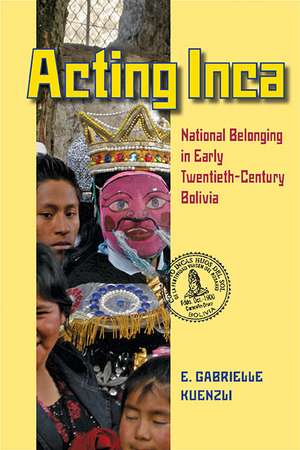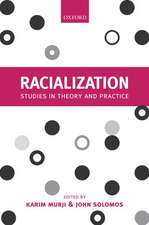Acting Inca: National Belonging in Early Twentieth-Century Bolivia: Pitt Latin American Series
Autor E. Gabrielle Kuenzlien Limba Engleză Paperback – 24 iun 2013
For most of the postcolonial era, the Aymara Indians of highland Bolivia were a group without representation in national politics. Believing that their cause would finally be recognized, the Aymara fought alongside the victorious liberals during the Civil War of 1899. Despite Aymara loyalty, liberals quickly moved to marginalize them after the war. In her groundbreaking study, E. Gabrielle Kuenzli revisits the events of the civil war and its aftermath to dispel popular myths about the Aymara and reveal their forgotten role in the nation-building project of modern Bolivia.
Kuenzli examines documents from the famous postwar Peñas Trial to recover Aymara testimony during what essentially became a witch hunt. She reveals that the Aymara served as both dutiful plaintiffs allied with liberals and unwitting defendants charged with wartime atrocities and instigating a race war.
To further combat their “Indian problem,” Creole liberals developed a public discourse that positioned the Inca as the only Indians worthy of national inclusion. This was justified by the Incas’ high civilization and reputation as noble conquerors, along with their current non-threatening nature. The “whitening” of Incans was a thinly veiled attempt to block the Aymara from politics, while also consolidating the power of the Liberal Party.
Kuenzli posits that despite their repression, the Aymara did not stagnate as an idle, apolitical body after the civil war. She demonstrates how the Aymara appropriated the liberal’s Indian discourse by creating theatrical productions that glorified Incan elements of the Aymara past. In this way, the Aymara were able to carve an acceptable space as “progressive Indians” in society. Kuenzli provides an extensive case study of an “Inca play” created in the Aymara town of Caracollo, which proved highly popular and helped to unify the Aymara.
As her study shows, the Amyara engaged liberal Creoles in a variety of ways at the start of the twentieth century, shaping national discourse and identity in a tradition of activism that continues to this day.
Kuenzli examines documents from the famous postwar Peñas Trial to recover Aymara testimony during what essentially became a witch hunt. She reveals that the Aymara served as both dutiful plaintiffs allied with liberals and unwitting defendants charged with wartime atrocities and instigating a race war.
To further combat their “Indian problem,” Creole liberals developed a public discourse that positioned the Inca as the only Indians worthy of national inclusion. This was justified by the Incas’ high civilization and reputation as noble conquerors, along with their current non-threatening nature. The “whitening” of Incans was a thinly veiled attempt to block the Aymara from politics, while also consolidating the power of the Liberal Party.
Kuenzli posits that despite their repression, the Aymara did not stagnate as an idle, apolitical body after the civil war. She demonstrates how the Aymara appropriated the liberal’s Indian discourse by creating theatrical productions that glorified Incan elements of the Aymara past. In this way, the Aymara were able to carve an acceptable space as “progressive Indians” in society. Kuenzli provides an extensive case study of an “Inca play” created in the Aymara town of Caracollo, which proved highly popular and helped to unify the Aymara.
As her study shows, the Amyara engaged liberal Creoles in a variety of ways at the start of the twentieth century, shaping national discourse and identity in a tradition of activism that continues to this day.
Din seria Pitt Latin American Series
-
 Preț: 429.67 lei
Preț: 429.67 lei -
 Preț: 450.40 lei
Preț: 450.40 lei -
 Preț: 355.58 lei
Preț: 355.58 lei -
 Preț: 431.62 lei
Preț: 431.62 lei -
 Preț: 392.66 lei
Preț: 392.66 lei -
 Preț: 388.79 lei
Preț: 388.79 lei -
 Preț: 428.14 lei
Preț: 428.14 lei -
 Preț: 362.33 lei
Preț: 362.33 lei -
 Preț: 416.05 lei
Preț: 416.05 lei -
 Preț: 393.58 lei
Preț: 393.58 lei -
 Preț: 330.31 lei
Preț: 330.31 lei -
 Preț: 394.57 lei
Preț: 394.57 lei -
 Preț: 389.76 lei
Preț: 389.76 lei -
 Preț: 334.31 lei
Preț: 334.31 lei -
 Preț: 388.79 lei
Preț: 388.79 lei -
 Preț: 396.85 lei
Preț: 396.85 lei -
 Preț: 350.79 lei
Preț: 350.79 lei - 17%
 Preț: 445.11 lei
Preț: 445.11 lei -
 Preț: 388.03 lei
Preț: 388.03 lei -
 Preț: 365.05 lei
Preț: 365.05 lei -
 Preț: 457.11 lei
Preț: 457.11 lei -
 Preț: 471.15 lei
Preț: 471.15 lei - 17%
 Preț: 384.07 lei
Preț: 384.07 lei -
 Preț: 428.14 lei
Preț: 428.14 lei -
 Preț: 389.17 lei
Preț: 389.17 lei -
 Preț: 394.65 lei
Preț: 394.65 lei -
 Preț: 429.89 lei
Preț: 429.89 lei -
 Preț: 392.66 lei
Preț: 392.66 lei -
 Preț: 424.88 lei
Preț: 424.88 lei -
 Preț: 389.38 lei
Preț: 389.38 lei -
 Preț: 432.57 lei
Preț: 432.57 lei -
 Preț: 419.06 lei
Preț: 419.06 lei -
 Preț: 393.58 lei
Preț: 393.58 lei -
 Preț: 354.23 lei
Preț: 354.23 lei -
 Preț: 458.07 lei
Preț: 458.07 lei -
 Preț: 389.76 lei
Preț: 389.76 lei -
 Preț: 363.26 lei
Preț: 363.26 lei -
 Preț: 502.82 lei
Preț: 502.82 lei -
 Preț: 423.91 lei
Preț: 423.91 lei -
 Preț: 395.54 lei
Preț: 395.54 lei -
 Preț: 153.64 lei
Preț: 153.64 lei -
 Preț: 351.72 lei
Preț: 351.72 lei -
 Preț: 383.01 lei
Preț: 383.01 lei -
 Preț: 393.58 lei
Preț: 393.58 lei -
 Preț: 351.55 lei
Preț: 351.55 lei -
 Preț: 351.72 lei
Preț: 351.72 lei -
 Preț: 389.76 lei
Preț: 389.76 lei -
 Preț: 331.86 lei
Preț: 331.86 lei -
 Preț: 358.46 lei
Preț: 358.46 lei -
 Preț: 362.95 lei
Preț: 362.95 lei
Preț: 384.00 lei
Nou
Puncte Express: 576
Preț estimativ în valută:
73.48€ • 77.27$ • 60.71£
73.48€ • 77.27$ • 60.71£
Carte tipărită la comandă
Livrare economică 17 aprilie-01 mai
Preluare comenzi: 021 569.72.76
Specificații
ISBN-13: 9780822962328
ISBN-10: 0822962322
Pagini: 208
Dimensiuni: 152 x 229 x 15 mm
Greutate: 0.32 kg
Ediția:1
Editura: University of Pittsburgh Press
Colecția University of Pittsburgh Press
Seria Pitt Latin American Series
ISBN-10: 0822962322
Pagini: 208
Dimensiuni: 152 x 229 x 15 mm
Greutate: 0.32 kg
Ediția:1
Editura: University of Pittsburgh Press
Colecția University of Pittsburgh Press
Seria Pitt Latin American Series
Recenzii
"The book really shines in its historiographical contribution . . . Acting Inca challenges a conventional literature that highlights Aymara resistance and opposition . . . Kuenzli challenges scholars to think about the rise of Evo Morales and Movimiento al Socialismo as not only the result of late twentieth-century indigenous identity politics but also the culmination of a much longer Aymara struggle for national inclusion."
—Hispanic American Historical Review
—Hispanic American Historical Review
“Before the publication of ‘Acting Inca,’ there were only a few analyses covering the intersection between the changing construction of Indian identity and nation building, both important developments in Bolivian history. An important contribution to the historiography of modern Latin American history.”
—H-Net Reviews
—H-Net Reviews
“Provides a fascinating account of the integral role played by Aymara intellectuals and political activists in Bolivian nation-building from the late 19th century to the present. . . . Kuenzli’s work should appeal widely to social scientists interested in nationalism, race, performance, and the politicized invention of tradition. Highly recommended.”
—Choice Magazine
—Choice Magazine
“Acting Inca examines how different groups in the twentieth century revised Bolivian history in order to ‘recast’ its present. In lively prose, Kuenzli tells the fascinating and disturbing story of how the Liberal Party, Aymara intellectuals, and others refashioned the Inca and Tiwanaku past, particularly the role of indigenous people. This book should appeal to scholars working on performance, race, and memory as well as everyone interested in contemporary Bolivia.”
—Charles Walker, University of California-Davis
—Charles Walker, University of California-Davis
“Acting Inca is an important book that presents novel interpretations of how intellectuals and activists intentionally construct politically acceptable forms of identity. It examines how the convergence of Aymara and Liberal interests established new forms of Bolivian identities based on the imagined memories of an Inca past rather than the realities of an Aymara present. Kuenzli challenges standard interpretations of the roles that the Aymara have played in Bolivia’s history and, in the process, historicizes the actions of the current administration of Evo Morales. Written in a clear and readable style, this book will appeal to a broad audience.”
—Marc Becker, Truman State University
—Marc Becker, Truman State University
Notă biografică
E. Gabrielle Kuenzli is assistant professor of history at the University of South Carolina.
Descriere
In this groundbreaking study, E. Gabrielle Kuenzli revisits the events of the Bolivian civil war and its aftermath during the early twentieth-century, to dispel popular myths about the Aymara and reveal their forgotten role in the nation-building project of modern Bolivia.
















